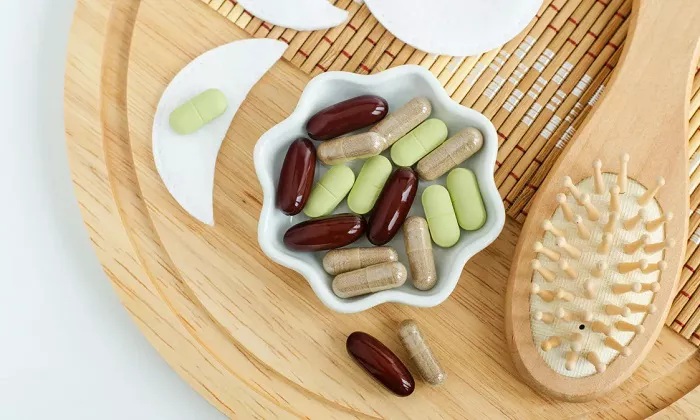Hair shedding is a normal part of life, but when it starts to noticeably affect hair thickness, it may be a sign of an underlying issue. While genetics and hormones often play a role, nutritional deficiencies—particularly in certain vitamins—can also contribute to hair loss. Experts suggest that addressing these gaps through diet or supplements may help improve hair health over time.
A balanced diet rich in vitamins and minerals not only supports overall wellness but can also significantly benefit your hair. Below are seven essential vitamins that play a crucial role in hair growth and thickness, along with dietary sources and precautions to consider.
Biotin (Vitamin B7)
Biotin helps stimulate the production of keratin, the key protein in hair structure, promoting stronger follicles and growth. Though true biotin deficiency is rare, it can result in thinning hair or hair loss in those affected.
Sources: Eggs, fish, meat, sweet potatoes, seeds, and nuts.
Recommended Intake: 30 micrograms daily for adults.
Note: While popular for hair supplements, some users report side effects like acne when taking high doses. Consult a healthcare provider if you notice adverse effects.
Vitamin A
Vitamin A supports the growth of all cells, including hair—the fastest-growing tissue in the human body. It also aids in sebum production, an oil that keeps the scalp moisturized and follicles healthy.
Sources: Carrots, sweet potatoes, kale, spinach, pumpkin, eggs, yogurt, milk, and cod liver oil.
Recommended Intake: 900 mcg for men and 700 mcg for women.
Caution: Overconsumption can lead to serious side effects, especially during pregnancy.
Vitamin C
This antioxidant powerhouse combats oxidative stress, a major factor in hair loss. Vitamin C also supports collagen production, helping prevent premature graying, and enhances iron absorption—a mineral essential for healthy hair.
Sources: Citrus fruits, strawberries, bell peppers, tomatoes, and guavas.
Recommended Intake: 90 mg/day for men and 75 mg/day for women.
Note: Excessive intake may lead to nausea, cramps, or kidney stones.
Vitamin D
Low levels of vitamin D are often linked to conditions such as alopecia and excessive hair shedding, particularly in adults over 65.
Sources: Sunlight, fatty fish, mushrooms, fortified foods like cereals and yogurt.
Recommended Intake: 600 IU per day for adults.
Overdose Risks: High doses can cause nausea, disorientation, and irregular heart rhythms.
Vitamin E
Like vitamin C, vitamin E helps reduce oxidative stress. A study found that participants who took vitamin E supplements for eight months saw a 34.5% improvement in hair growth.
Sources: Sunflower seeds, spinach, avocados, and almonds.
Recommended Intake: 15 mg daily.
People with certain conditions, like Crohn’s disease or cystic fibrosis, may be more prone to vitamin E deficiency and should monitor their levels closely.
Iron
Iron supports red blood cells in carrying oxygen throughout the body, including to hair follicles. A lack of iron, particularly common in women, can lead to increased hair loss.
Sources: Red meat, eggs, spinach, lentils, clams, and oysters.
Recommended Intake: Up to 45 mg per day.
Side Effects: Too much iron may cause digestive issues like constipation and vomiting.
Zinc
Zinc is vital for maintaining oil gland function around hair follicles and promoting regrowth. Deficiency can lead to hair thinning or loss.
Sources: Beef, lentils, pumpkin seeds, spinach, oysters, and wheat germ.
Recommended Intake: 11 mg/day for men and 8 mg/day for women.
Warning: Excessive intake may cause headaches, stomach pain, or reduced “good” cholesterol levels.
Do Hair Vitamins Really Work?
The effectiveness of hair supplements varies. While some individuals experience improved growth and stronger strands, others may see little change. Consistency is key—results may take several months to appear and often depend on factors like diet, genetics, and the root cause of hair loss.
In online forums like Reddit, users frequently discuss their experiences. One contributor noted improvements in both hair and nails after using collagen and biotin supplements consistently, reporting reduced breakage and enhanced strength.
Expert Hair Health Advice
While these vitamins can help boost hair health, they are not a universal cure. If you are losing an unusual amount of hair, it’s important to consult a healthcare professional. A tailored approach that includes proper diagnosis, dietary recommendations, and possibly supplements offers the most effective path to recovery.
A diet enriched with the right nutrients can be an effective, natural way to maintain or restore hair vitality. These seven vitamins—when consumed in recommended amounts—can aid in reducing shedding, improving texture, and promoting growth. For anyone looking to enhance their hair health tips routine, ensuring these vitamins are part of your daily intake could make a visible difference over time. Always speak to your doctor before beginning any new supplement regimen.
Related Topics:
- Vitamins for Hair Growth Market to Hit $6.2B by 2031
- Experts Recommend Scalp Massagers to Boost Hair Health and Growth
- Restyla Air Redefines Hair Styling with Smart Innovation


